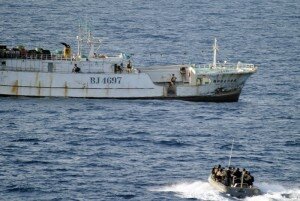
Bartamaha (Nairobi):- Signaling a new offensive mindset, international military officials vowed Friday to fight the pirates as swarms of Somalis moved into the waters off East Africa. Four shootouts with pirates showed that high-seas attacks are intensifying with the end of the monsoon season.
Nearly half the 47 ships hijacked off Somalia last year were taken in March and April _ the most dangerous months of the year for ships in the Gulf of Aden and Indian Ocean.
In the most serious skirmish Friday, six pirates attacked a vessel before breaking off and chasing the French fishing boat Torre Giulia, said Cmdr. John Harbour, spokesman for the EU Naval Force.
A French military detachment onboard a nearby ship fired warning shots at the pirates. The ship then approached the skiff and collided with it, sinking the skiff and throwing the pirates into the water. Four were rescued, but two others were missing, Harbour said.
The French Defense Ministry said its frigate, the Nivose, intercepted 22 suspected pirates Friday in two separate operations. It said the 22 are currently aboard the vessel along with their skiffs.
Each case, in different sectors, involved a mothership and two “assault skiffs,” a ministry statement said.
Harbour said a spike in attacks is likely in the coming weeks. This season, though, ship owners and sailors are more prepared to evade pirates, fight back, or they have armed security onboard, raising the likelihood of violence.
“We know the monsoon is over. We know they’re coming. We’re taking the fight to the pirates,” said Harbour.
Crews are successfully repelling more attacks, making it harder for pirates to capture ships and earn multimillion dollar ransoms.
In turn, the Somali gangs are increasingly turning violent. The International Maritime Bureau says only seven ships were fired on worldwide in 2004 but that 114 ships were fired on last year off the Somali coast alone. That’s up from 39 incidents off Somalia and in the Gulf of Aden in 2008.
In a second incident Friday, the EU Naval Force intercepted a pirate group of one mothership and two skiffs that had attacked a separate French vessel. That attack was also repelled by military personnel onboard.
An EU Naval Force helicopter tracked the pirates and watched them throw a rocket launcher, grappling hooks and fuel barrels into the ocean. The naval force said it destroyed the mothership and one skiff and took 11 pirates into custody.
In the third and fourth attacks, pirates assaulted two Spanish tuna fishing boats off the coast of Kenya, Spain’s Ministry of Defense said. A spokesman said the boats had contacted Spanish navy forces in the area, who dispatched a plane. Between the air support and the private guards on the boats, they repelled the attack. The spokesman spoke on condition of anonymity because government rules don’t allow him to be identified.
Friday’s clashes followed a firefight Thursday between pirates and private security contractors onboard a Spanish fishing vessel. The pirates hit the ship with a rocket-propelled grenade and the guards returned fire. No one was hurt, but the International Maritime Bureau has expressed fears that the increased use of armed contractors could spark an arms race between fishermen and pirates, who are firing at ships with increasing frequency.
“The EU Navfor agrees with that recommendation because we don’t want an escalation of firepower,” Harbour said. “Also, there are lots of gas and oil tankers in the Gulf of Aden that wouldn’t benefit from grenades and bullets flying around.”
Pirate attacks off East Africa have dramatically increased over the past three years. Somali pirates attacked ships 217 times in 2009, according to the International Maritime Bureau. That was up from 111 attacks in 2008.
Many ship owners are investing in physical defenses like stringing razor wire and adding fire hoses that can hit attackers with streams of high-pressure water. Some ships are even having electric fence-style systems installed.
Crews have thrown everything from oil drums to wooden planks at would-be hijackers clambering up ladders. Last month a crew played the sound of dogs barking over an amplifier to frighten off attackers.
Last year, the average ransom was around $2 million, according to piracy expert Roger Middleton of the British think tank Chatham House. This year, two ransoms paid were around $3 million and $7 million, he said.
The original Somali pirates were fishermen aggrieved over the huge foreign trawlers depleting their seas _ a complaint the international community has yet to address despite pouring hundreds of millions of dollars into anti-piracy patrols. Huge ransoms lured criminal gangs into piracy, though, and ransom inflation has made it more expensive to buy the freedom of the more than 130 hostages still being held.
Among those hostages are a retired British couple snatched last year from their sailboat, who a Somali official said Friday could be freed within weeks. Paul and Rachel Chandler were seized from their 38-foot yacht last October.
Mohamed Omar Dalha, the deputy speaker of Somalia’s parliament, told The Associated Press that Somali communities inside and outside the chaos-wracked country are working to negotiate the “unconditional release” of the Chandlers. Dalha was hopeful they would be released within two weeks without payment.
Somalia has not had a stable government since warlords overthrew longtime dictator Mohamed Siad Barre in 1991.
___
Associated Press reporters Malkhadir M. Muhumed and Jason Straziuso in Nairobi and Jorge Sainz in Madrid contributed to this report.



